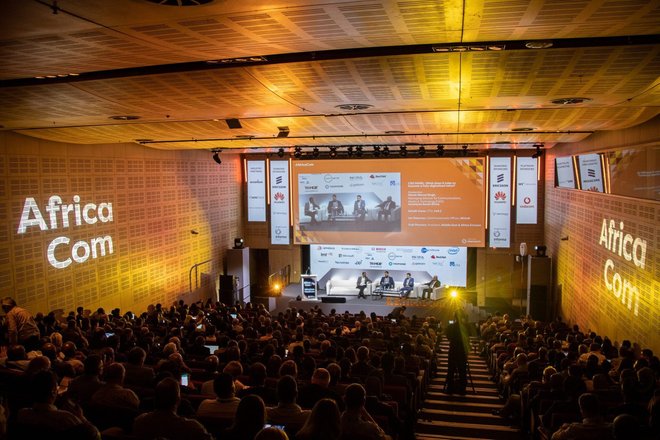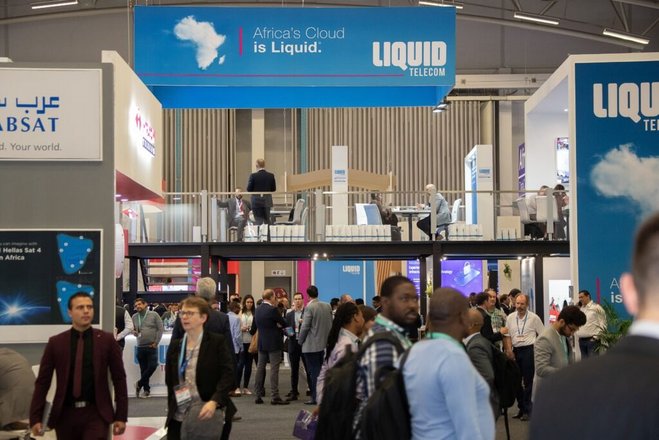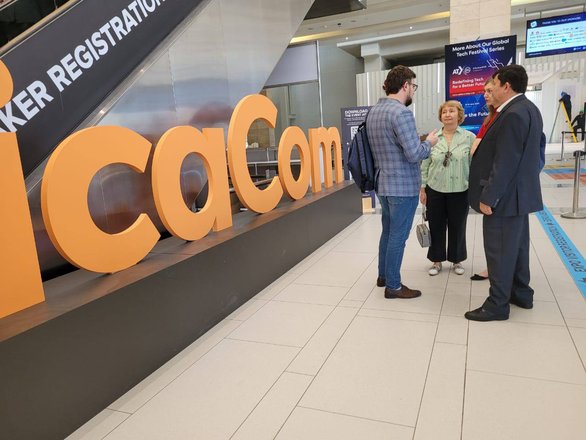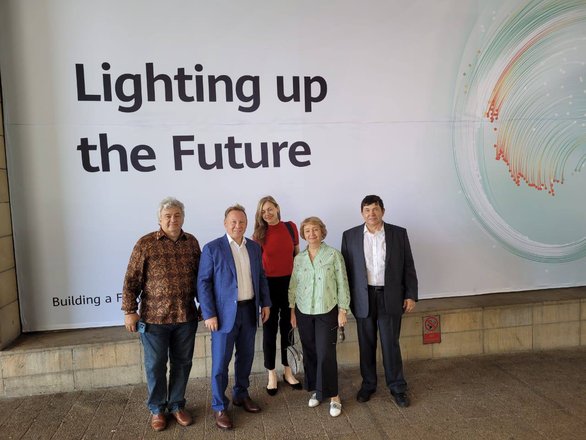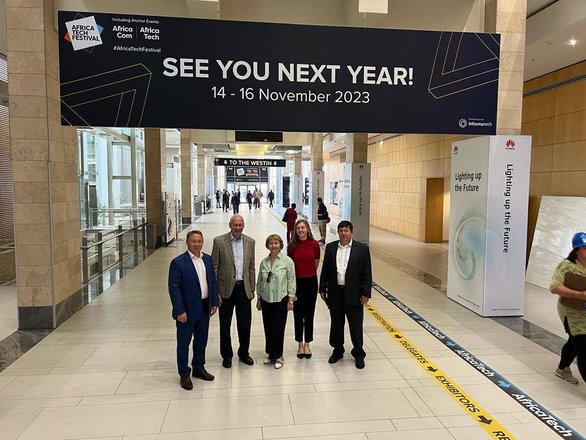Cosmic prospects: satellite communication as key enabler of bridging digital divide in Africa
On November 7-10, Cape Town is hosting AfricaCom 2022, Africa's largest sectoral event dedicated to new technology and innovation in telecommunications. A large block of discussions at the conference was devoted to the digital divide on the African continent, in the bridging of which satellite technologies play a major role. The RSCC delegation at the exhibition presents modern satellite services based on the company's space constellation, allowing to provide residents of the African region with the necessary digital services.
RSCC operates in Angola, Nigeria, the Republic of Chad, Burkina Faso, Sudan and other countries in the region. The continent is covered by three of RSCC's 12 satellites: Express-AM8, Express-AM7 and Express-AM6.
Africa's space economy was valued at more than $19 billion in 2021 and is projected to grow another 16.16% to $22.64 billion by 2026. The industry employs more than 19,000 people across the continent.
African nations have committed a total of about $534 million to their space programs in 2022, a 2.24% increase over 2021. Africa's space economy continues to grow at a pace that exceeds Africa's GDP growth rate. It is also becoming a strategic tool for stimulating national economies and achieving sustainable development goals on the continent. As of 2022, 13 African nations have produced 48 satellites. Basically, work is being done on small satellites, because they make it possible to launch a full-fledged service and "educate" the necessary personnel in the country at a sufficiently low investment.
The most popular services in this industry are:
• Internet of Things (IoT);
• weather forecasting and early disaster warning systems;
• monitoring of crops, forests, animal movements, water resources, etc.
Space in Africa estimates that in 2022, 272 NewSpace companies located in 31 African countries are developing and promoting new uses for space technology, offering applications in several fields, including industry, medicine, transportation and logistics, among others.
Satellite communications are expected to play an important role in bridging the communication services consumption gap in Africa, while global positioning and satellite TV services will become the most significant sectors of the space economy on the continent.
The market of satellite communications – both fixed (FSS) and mobile (MSS) – and satellite television accounted for the bulk of the African space and satellite industry in 2021. A significant share of revenue came from the major direct satellite broadcasters: DSTV, Canal+ Afrique, and StarTimes.
Africa leads the sad championship of digital divide
Today, the digital divide in Africa is greater than anywhere else in the world.
This can be seen both in the percentage of Internet penetration among the population (in Africa it is 33%, compared to 87% in Europe and 63% worldwide), and in the quality of connection available to each user (in Africa it is 50 kbps, in Europe 350 kbps, and the global figure is 180 kbps).
Today, only 14 African countries have reached their "affordability threshold" of 1 GB of traffic, which costs less than 2% of the average monthly household income. On average, 1 GB of mobile data costs about 5.7% of the average monthly income in Africa.
The gap can also be seen in the serious connectivity lag between the village and the city. In African countries, urban areas account for 50% of the connected population, with only 15% in rural areas, the lowest indicator in the world.
Consulting agencies estimate that the Middle East and Africa maritime satellite market accounted for about 13% of the global market in 2020. Also, there are no on-flight connectivity providers in Africa. So today there is virtually no market in Africa for transport communication services.
Specific commitments to bridge the digital divide in Africa
At WTDC 2022 in Kigali, Rwanda, specific commitments to bridge the digital divide were made for the first time by national regulators, international organizations and businesses, with a particular focus on African countries. Satellite technology should play a leading role in connecting remote areas.
The Global Satellite Operators Association (GSOA), an active participant in the WTDC, noted in its statement the need to accelerate the elimination of the digital divide, because at the pace at which this process is being implemented today, it could last for an unacceptably long time — up to a hundred years. Satellite technology should be a key factor in accelerating the closing of the gap, and GSOA has committed to increasing satellite access by 250% by the year 2030.
"So we, our members, want to use the momentum, to follow the guidance of ITU, which, as you know, invites everybody now to really take up this challenge. And satellite operators are aware of the responsibility they have as satellite can play its rightful role in bridging the digital divide," said Aarti Holla-Maini, Secretary General of GSOA. The first step in this direction was the agreement signed by GSOA and Rwanda Space Agency at the WTDC to support the deployment of a satellite communications network in rural areas.
One regional feature noted by players in the African satellite communications market in terms of digital availability (in addition to age, gender and other subtleties common to all regions) is the gap between African countries that have launched their satellites and the African states that do not have satellites. Therefore, Africa's efforts must be concentrated; without centralized measures by satellite operators, it will be impossible to eradicate the digital divide.
Participants in various African space forums also confirm the special role of satellite communications in the development of information and communications services on the continent. Ground networks are unable (and will not be able for quite some time) to meet the population's need for connectivity. Therefore, unlike in many other regions where satellite provides backup channels, in Africa, space-based communication is the primary technology. Cheaper satellite capacity gives African countries, including those that cannot build a national satellite network, a good chance to develop communications networks.
Eutelsat and SES focus on broadband
Among global operators, Eutelsat and SES are the most active on the African market. Both operators have long worked in the DTH market and today point to Africa as one of the priority areas for the development of satellite broadband services.
Eutelsat's main activity at the moment is centered around the ultra-high-capacity Eutelsat Konnect satellite whose commercial operation began at the end of 2020. The operator has signed agreements with several providers and renders services in a number of African countries, expanding its footprint: the company now operates in a total of 27 countries. Among the latest contracts, there is an agreement with Liquid Intelligent Technologies who will not only provide Konnect services in Uganda, South Sudan and the eastern regions of the DRC but will also build the first Eutelsat Konnect gateway in Africa, allowing the provider to count on a leading role in the distribution of Konnect services in that market. Liquid is already a longtime partner of Eutelsat: the company uses the bandwidth of the Eutelsat 7B satellite to organize VSAT networks in sub-Saharan Africa.
The provider notes high demand for bandwidth from existing customers who are ready to switch to higher-speed Ka-band service.
SES, too, has long been cultivating the African market through partnerships with local operators. The largest of them, InterSat, cooperates with SES to build communications networks in remote regions of 32 African countries.
The operator plans to reach a new level of service for the African connectivity market with the commissioning of the medium-altitude O3b mPower constellation, the launch of which is scheduled for the end of 2022. Here SES builds its strategy based on cooperation with mobile operators. One of the main partners is Orange: this operator operates in 18 African states and has already launched services in several countries via the first-generation O3b constellation. One of the first users of O3b mPower will be Sonatel, the company's subsidiary in Senegal, and Orange has already deployed the first African O3b mPower gateway with Sonatel.
Russian satellites for Angola
Russian companies also see the African market as one of the most promising markets. In October 2022, Angosat-2, a satellite created at ISS Reshetnev, was successfully placed into orbit. The new Angosat-2 is based on the Express-1000 platform, with the payload supplied by Airbus. The satellite will operate in C-, Ku- and Ka-bands, providing the whole range of communication services such as truck links, direct TV broadcasting, and broadband access.
RSCC is also actively developing the African line of business. The satellites of RSCC provide coverage of the entire African continent from Algeria to South Africa. Express-AM8 satellite, located at 14°W, provides C-band and Ku-band communications in West Africa. Express-AM7 satellite (40°E) provides C-band coverage of Central Africa for trunking communications networks and Internet access. Express-AM6 (53°E) provides coverage of the entire Pan-African region. The combination of redirected beams allows service providers to set up communications both within the region and between Africa and Europe.
